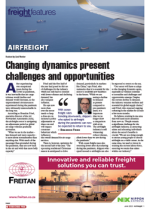Africa has long grappled with a significant infrastructure deficit. While this presents numerous challenges across various sectors, it also offers a unique opportunity for the airfreight industry to play a vital role in bridging the gaps and driving economic growth, says Brandon Fried, executive director of the Air Forwarders Association (AfA)."Similar to the situation in Alaska, where remote native towns rely heavily on airfreight due to the lack of good roads, Africa faces challenges. Political complexities, limited technological advancements, labour issues, geopolitical tensions, and inconsistent regulations all contribute to the obstacles encountered by the African air cargo industry. However, despite these challenges, the potential for growth and the crucial role of air cargo in servicing the continent remains evident," said Fried.Speaking to Freight News from his headquarters in Washington in the US, he said the absence of good road networks allowed the air cargo sector to grow its foothold on the continent. "At the same time, Africa has the opportunity to embrace some of the innovations and significant advancements being made with autonomous planes and drones."According to Fried, there are concerns for the airfreight sector at large. "The scarcity of skilled workers and the lack of awareness regarding the benefits of pursuing careers in this sector are problematic. Educating populations about the advantages of air cargo as a viable profession is essential," he said. "The ever-changing and non-harmonised regulations in the air cargo industry pose another significant hurdle. While security measures are necessary to combat terrorism and safeguard lives, aircraft, and cargo, the lack of consistent regulations across countries creates vulnerabilities. Differences in the implementation of advanced data exchange and cargo screening protocols, such as the disparity between the United States preloading advance cargo initiative and Europe's red-to-green approach, lead to delays and inconsistencies in policy, hindering efficient operations."According to Vijan Chetty, a member of the board of directors of the Cool Chain Association (CCA), the efficient transportation of particularly perishable goods in Africa is hampered by the dire state of infrastructure. “It is the single biggest challenge within the African continent. The growth in infrastructure did not keep up with the rate of growth in imports, exports, and cross border activities.He told Freight News that limited f lights across the continent reduced the options available for highly perishable cargo. “As a continent it is therefore important that we look at ways to not only reduce the logistics costs involved but also develop airfreight solutions, meaning having more f light options available.”Asked about trends, Chetty said especially within South Africa more unpopular temperature-sensitive perishable products, for example, animal carcasses, were being transported by airfreight more regularly. “The agents are utilising a combination of cooling techniques to maintain the cool chain. The animal carcasses are transported with a combination of ice packs, thermal blankets and dry ice to maintain the cool chain. The product is also protected against chilling injury.”

